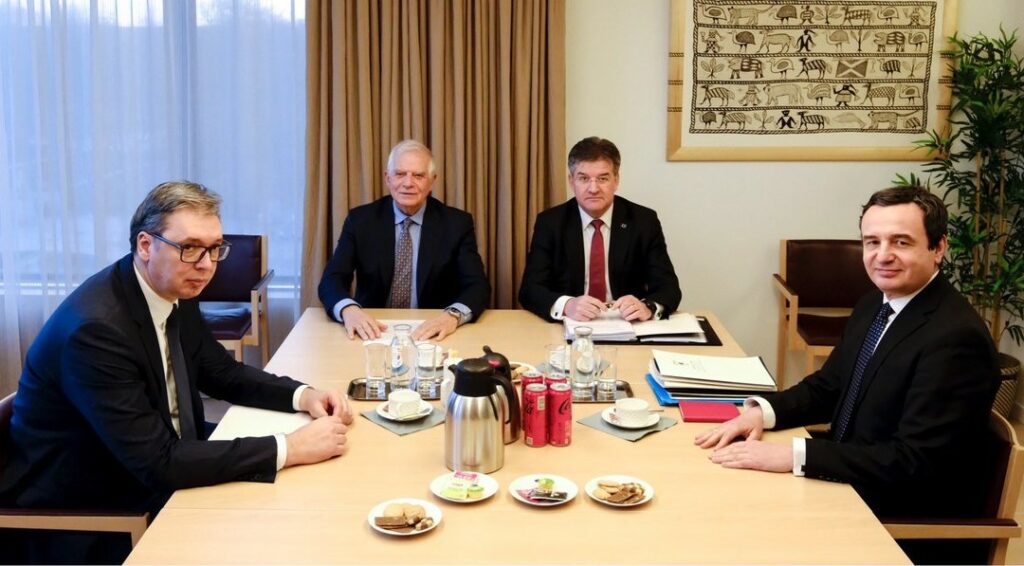The EU-facilitated dialogue between Serbia and Kosovo resulted in February last year in an agreement between the two countries to normalise their relations to pave their way for EU membership but the implementation of the agreement has stalled since then.
The dialogue is chaired by EU’s foreign policy chief, High Representative Josep Borrell. In February, he said that the two Western Balkans countries had expressed their readiness to proceed with implementation of the agreement but that further negotiations were needed to determine specific implementation modalities of the provisions.
Those talks took place in March in Ohrid, North Macedonia, where the parties agreed, at least according to Borrell, to an annex to the agreement, which became an integral part of the agreement. They committed to honour all articles of the agreement and the annex, and implement all their respective obligations stemming from them expediently and in good faith.
But the documents were never signed by Serbia’s President Aleksandar Vucic and Kosovo’s Prime Minister Albin Kurti. Despite crisis-management meetings, the EU could not convince them to start implementing the agreement. “This is very regrettable, and it speaks volumes about the Parties’ true commitment to normalisation of relations – or rather the absence of it,” Borrell complained.
He accused them of violating their dialogue obligations and breaching their promises. Peter Stano, EU’s lead spokesperson for foreign affairs, commented that the dialogue had not failed, at least not yet, only a round in the process because the partied failed to agree. He admitted that it was a scenario which keeps repeating itself with the parties unable to bridge their differences.
He recalled that the EU is not party to the dialogue, only Kosovo and Serbia. EU’s role is to facilitate the dialogue based on the wishes expressed by both parties and the endorsement by all member states. “We are there to help them to bridge their differences but we’ll never succeed if they refuse to go down the path of compromise.”
No to imposed solution
It is not up to the EU to impose any solution on the parties, especially as they both have expressed clearly that their strategic objective is to join the EU, he explained. “The accession process is the leverage the EU has. Without progress in the dialogue, the accession process cannot advance.”
Asked about the current state of play, the spokesperson replied on Tuesday that Serbia and Kosovo have committed to deliver on the normalisation agreement. “We consider the commitment to be legally binding,” he stressed, referring to the Vienna Convention on the Law of Treaties. According to the Convention, the consent of a state to be bound by a treaty can be expressed in different ways.
The spokesperson explained that the agreement with its implementation annex become legally binding through High Representative Borrell’s written statement after the meeting on 18 March 2023 in Ohrid. In the statement, Borrell said that the EU welcomes the Parties agreeing on the implementation.
This expression of consent was explained to the Parties in Ohrid. Both Serbia and Kosovo accepted or did not object to it. “Everyone knows where we stand and what they need to do,” the spokesperson said this week. However, since the Ohrid meeting, the Serbian president has distanced himself from the agreement and denied that he agreed to it.
The agreement itself does not mention how the Parties should express their consent to it, by signature or by other means. In one of the paragraphs, it hints that the agreement is not final or complete. “Both Parties will continue with new impetus the EU-led Dialogue process which should lead to a legally binding agreement on comprehensive normalization of their relations.”
New benchmarks in chapter
The annex also states that more needs to be done. The Parties noted that immediately after the adoption of the Agreement and the Annex, the EU Facilitator will start the process to amend the Chapter 35 benchmarks for Serbia to reflect its new obligations stemming from these documents. This acquis chapter is currently empty but might include issues that come up during the negotiations.
In fact, the Commission and the High Representative were tasked by the General Affairs Council last December to “urgently propose to the Council, before the end of January 2024, the amendments to the benchmarks of Chapter 35 of Serbia’s accession negotiations to reflect Serbia’s obligations stemming from the Agreement and its Implementation Annex”.
Work on this is proceeding according to the Council conclusions, the spokesperson said. But it is not certain that the Council will agree on the benchmarks as Hungary, which supports Serbia’s position, is reportedly blocking the addition of them to chapter 35. The benchmarks have already been drafted but has not yet been discussed in the Council working group.
As previously reported, the main sticking points are the implementation of local self-government for the Serb majority municipalities in north Kosovo and the sequencing of measures. “Both Serbia and Kosovo need to implement each a major issue of the agreement at about the same time,” an expert on the Western Balkans told The Brussels Times on the condition of anonymity.
Among others the Parties are supposed to “mutually recognise their respective documents and national symbols, including passports, diplomas, licence plates, and customs stamps”. The issue of vehicle license plates seems a minor issue but has caused tension since 2021 and was only recently resolved after the two countries formally recognized each other’s license plates.
"Technically speaking, the question whether the agreement is legally binding will be resolved by adding the content of the agreement to chapter 35 in the form of benchmarks,” the expert explained."
M. Apelblat
The Brussels Times

